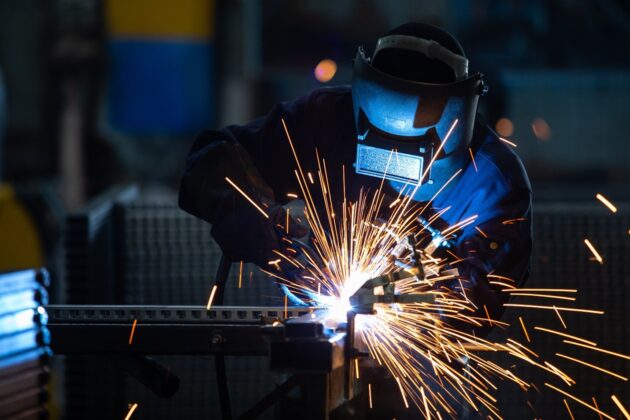Welding is an essential trade that involves joining metal parts through the application of heat, pressure, or both. It’s a skill that supports a wide array of industries, including construction, automotive, shipbuilding, and manufacturing. Like any career, welding has its pros and cons, and deciding if it’s the right choice for you requires understanding what the job entails. In this article, we will explore the benefits and challenges of a welding career, covering aspects such as physical demands, job prospects, and potential earnings. Declan Birmingham of Dekalb, with his welding certifications, exemplifies the commitment needed to succeed in this field.
Pros of Being a Welder
High Demand and Diverse Opportunities
One of the most significant advantages of pursuing a welding career is the high demand for welders across many industries. Welders are needed in a range of sectors, including automotive, construction, aerospace, and manufacturing. The versatility of welding skills also allows professionals to work in specialized areas like underwater welding, pipeline welding, or artistic metalworking. With welding being a critical part of infrastructure projects, the demand for skilled welders is expected to remain steady in the coming years.
Good Earnings Potential
The earning potential for welders is competitive, especially for those who hold advanced certifications or specialize in niche areas. Entry-level welders can expect to earn around $35,000 to $45,000 annually, depending on their location and the type of work they do. With experience and additional certifications, welders can see their income rise to $60,000 or even higher. Specialized welders, such as those working underwater or in hazardous environments, can command even higher salaries, sometimes exceeding $100,000 per year.
Hands-On, Practical Work
If you prefer working with your hands and enjoy seeing the tangible results of your efforts, welding is an ideal career choice. Welders get to create, repair, and maintain structures, vehicles, and equipment, allowing them to take pride in their craftsmanship. Unlike many desk jobs, welding provides a sense of fulfillment and accomplishment that comes from working on physical projects and seeing the immediate impact of your work.
Job Flexibility and Travel Opportunities
Welding can provide job flexibility in terms of hours, types of work, and locations. Welders have the opportunity to work on contract or freelance jobs, allowing them to take on projects that fit their schedule and interests. Moreover, many welding jobs are available in different regions, providing opportunities for travel. For those who enjoy seeing new places, certain welding jobs, such as those in the oil and gas industry, can take you to different parts of the country or even the world.
Cons of Being a Welder
Physical Demands and Health Risks
Welding is a physically demanding job that requires strength, endurance, and stamina. Welders are often required to work in uncomfortable positions—kneeling, bending, or reaching overhead for extended periods. This physical strain can lead to long-term musculoskeletal problems, especially for welders who do not practice proper ergonomic techniques or take care of their bodies.
In addition to physical strain, welders are exposed to hazards such as intense heat, sparks, and ultraviolet light from welding arcs. Prolonged exposure without proper safety gear can lead to burns, eye damage (commonly known as “welding flash”), and respiratory issues from inhaling fumes and gases. To mitigate these risks, welders must adhere to strict safety protocols, including wearing personal protective equipment (PPE) like welding helmets, gloves, and respiratory protection.
Unpredictable Work Conditions
Welders often work in challenging and sometimes extreme environments. Depending on the industry, welders may find themselves working outdoors in all types of weather conditions or in confined spaces. For instance, pipeline welders may have to work in remote locations, while shipyard welders might work in tight quarters below deck. These conditions can make the job physically exhausting and mentally taxing. Additionally, some welding jobs may require long or irregular hours, including night shifts or overtime, to meet project deadlines.
Certification and Training Requirements
Becoming a welder requires a certain level of training and certification. While some welders learn through on-the-job training or apprenticeships, many employers prefer candidates who have completed formal welding programs and obtained certifications. Achieving these certifications requires time, money, and dedication. Furthermore, maintaining certifications may involve periodic testing and continuing education, as welding standards and technologies evolve over time.
Exposure to Economic Fluctuations
The demand for welders can be influenced by economic conditions, particularly in industries like construction and manufacturing. During economic downturns, construction projects may be delayed or canceled, which can lead to reduced job opportunities for welders. This means that welding, like many skilled trades, can experience periods of job instability depending on market conditions. Welders may need to be prepared to adapt by learning new skills or seeking opportunities in different industries during slower periods.
Is Welding Right for You?
Ultimately, deciding whether welding is the right career for you depends on your interests, abilities, and long-term goals. Welding can be a highly rewarding career for those who enjoy hands-on work, creating tangible results, and being part of projects that have a lasting impact. The potential for good earnings, diverse opportunities, and job flexibility makes welding an attractive option for many people.
However, it’s essential to consider the challenges that come with the job, including physical demands, exposure to hazards, and the need for ongoing certification and training. Welders must be diligent about safety, physically resilient, and willing to work in less-than-ideal conditions. If you are someone who values a structured work environment with consistent hours, welding might not be the best fit for you.
On the other hand, if you are adaptable, enjoy working with your hands, and are motivated by the prospect of a dynamic and varied work environment, welding could be a fulfilling career path. With proper training, certifications, and a commitment to safety, welding offers opportunities for growth, specialization, and a sense of accomplishment that comes from building and repairing the infrastructure that supports our daily lives.
